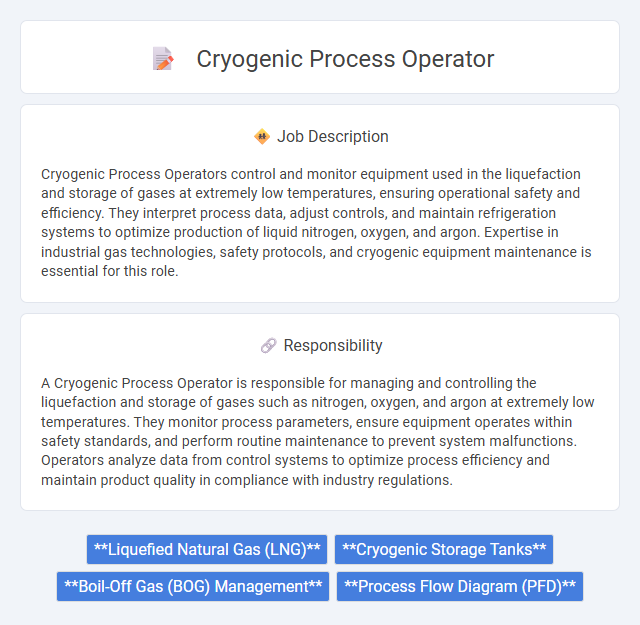
Cryogenic Process Operators control and monitor equipment used in the liquefaction and storage of gases at extremely low temperatures, ensuring operational safety and efficiency. They interpret process data, adjust controls, and maintain refrigeration systems to optimize production of liquid nitrogen, oxygen, and argon. Expertise in industrial gas technologies, safety protocols, and cryogenic equipment maintenance is essential for this role.
Individuals who are comfortable working in cold environments and can maintain focus during repetitive tasks will likely be well-suited for a cryogenic process operator role. The job may be challenging for those with claustrophobia or sensitivity to extremely low temperatures due to exposure to cryogenic substances. Physical stamina and attention to safety protocols increase the probability of success and suitability in this high-risk, specialized position.
Qualification
A Cryogenic Process Operator must have a strong background in mechanical or chemical engineering, often supported by a technical diploma or associate degree in process technology or industrial operations. Extensive knowledge of cryogenic systems, refrigeration cycles, and safety protocols is essential, along with hands-on experience in operating and maintaining cryogenic equipment. Certification in hazardous materials handling and the ability to monitor instrumentation and process control systems enhance qualification for this specialized role.
Responsibility
A Cryogenic Process Operator is responsible for managing and controlling the liquefaction and storage of gases such as nitrogen, oxygen, and argon at extremely low temperatures. They monitor process parameters, ensure equipment operates within safety standards, and perform routine maintenance to prevent system malfunctions. Operators analyze data from control systems to optimize process efficiency and maintain product quality in compliance with industry regulations.
Benefit
Cryogenic Process Operator roles likely offer competitive salaries and comprehensive benefits packages, including health insurance and retirement plans. Access to specialized training and career advancement opportunities may enhance job stability and personal development. Employees might also experience a safe working environment due to strict industry safety protocols.
Challenge
The role of a Cryogenic Process Operator likely involves managing complex low-temperature systems where precise control is critical to prevent operational failures and ensure safety. Operators probably face challenges such as maintaining equipment integrity under extreme conditions and troubleshooting unexpected anomalies in cryogenic processes. The job may require quick decision-making skills and strong technical knowledge to handle high-pressure situations effectively.
Career Advancement
Cryogenic Process Operators gain specialized skills in handling liquefied gases, enabling progression to senior operator or shift supervisor roles within industrial gas plants. Mastery of process control and safety protocols opens opportunities for technical trainer positions or transition into engineering support roles. Continuous certification in cryogenic technology enhances prospects for leadership and management careers in process operations.
Key Terms
Liquefied Natural Gas (LNG)
Cryogenic Process Operators in the Liquefied Natural Gas (LNG) sector control and monitor low-temperature systems to liquefy natural gas for storage and transportation. They manage equipment such as compressors, heat exchangers, and cryogenic pumps to maintain optimal temperatures near -162degC, ensuring product quality and safety standards. Expertise in process control and troubleshooting is essential for efficient LNG production and minimizing operational risks.
Cryogenic Storage Tanks
Cryogenic Process Operators specialize in managing Cryogenic Storage Tanks designed to store liquefied gases at extremely low temperatures, such as liquid nitrogen, oxygen, and natural gas. These operators ensure the integrity and safety of the tanks by monitoring pressure, temperature, and fluid levels using advanced control systems and sensors. Proper handling of Cryogenic Storage Tanks is vital to maintaining product purity, preventing leaks, and minimizing boil-off losses in industrial applications.
Boil-Off Gas (BOG) Management
Cryogenic Process Operators are responsible for managing Boil-Off Gas (BOG) in liquefied natural gas (LNG) storage and transportation systems to minimize product loss and ensure safety. They monitor temperature and pressure levels in cryogenic tanks, operate compressors and reliquefaction units to capture and re-liquefy BOG, maintaining system integrity and environmental compliance. Effective BOG management reduces greenhouse gas emissions and optimizes overall process efficiency in LNG facilities.
Process Flow Diagram (PFD)
A Cryogenic Process Operator relies heavily on Process Flow Diagrams (PFDs) to monitor and control the liquefaction and separation of gases at extremely low temperatures. These diagrams detail critical components such as compressors, heat exchangers, and distillation columns, providing a clear visualization of process sequences and fluid dynamics. Mastery of PFDs ensures precise adjustment of operational parameters to maintain safety and efficiency in cryogenic gas processing plants.
 kuljobs.com
kuljobs.com